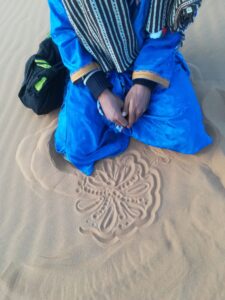 Amazigh bedeutet „freie Menschen“. Die Amazigh-Kultur in Marokko, auch als Berber-Kultur bekannt, wobei der Begriff „Amazigh“ der bevorzugte und respektvolle Name für diese ethnische Gruppe ist, zeichnet sich durch ihre reichen Traditionen und einzigartigen Merkmale aus. Die Amazigh sind die Ureinwohner Nordafrikas und leben sowohl im Atlasgebirge als auch in Ländern wie Marokko, Tunesien, Algerien, Libyen und Mauretanien. Ihre Kultur ist geprägt von einer tiefen Verbundenheit zur Natur und einem Glauben an deren Beseeltheit.
Amazigh bedeutet „freie Menschen“. Die Amazigh-Kultur in Marokko, auch als Berber-Kultur bekannt, wobei der Begriff „Amazigh“ der bevorzugte und respektvolle Name für diese ethnische Gruppe ist, zeichnet sich durch ihre reichen Traditionen und einzigartigen Merkmale aus. Die Amazigh sind die Ureinwohner Nordafrikas und leben sowohl im Atlasgebirge als auch in Ländern wie Marokko, Tunesien, Algerien, Libyen und Mauretanien. Ihre Kultur ist geprägt von einer tiefen Verbundenheit zur Natur und einem Glauben an deren Beseeltheit.
Die Musik der Amazigh hebt sich durch rhythmische Trommeln, Flöten und Gesänge hervor. Traditionelle Instrumente wie die Bendir (Rahmentrommel) und die Ghaita (eine Art Oboe) sind weit verbreitet und prägen den Klang ihrer Musik. Tätowierungen, ein weiteres bedeutendes kulturelles Element, dienen als Schutz auf Reisen und tragen zur kulturellen Identität der Amazigh bei.
Amazigh means “free people.” The Amazigh culture in Morocco, also known as Berber culture, with the term “Amazigh” being the preferred and respectful name for this ethnic group, is distinguished by its rich traditions and unique characteristics. The Amazigh are the indigenous people of North Africa and live both in the Atlas Mountains and in countries such as Morocco, Tunisia, Algeria, Libya, and Mauritania. Their culture is defined by a deep connection to nature and a belief in its animacy.
The music of the Amazigh stands out for its rhythmic drums, flutes, and songs. Traditional instruments such as the Bendir (frame drum) and the Ghaita (a type of oboe) are widely used and shape the sound of their music. Tattoos, another significant cultural element, serve as protection during travels and contribute to the cultural identity of the Amazigh.
© Urheber Rechtsgesetz Chero Grunder






